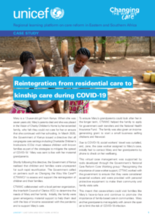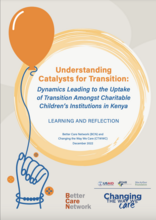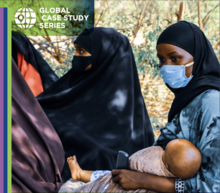This country page features an interactive, icon-based data dashboard providing a national-level overview of the status of children’s care and care reform efforts (a “Country Care Snapshot”), along with a list of resources and organizations in the country.
demographic_data
childrens_living_arrangement
children_living_without_bio
adoption
social_work_force
key_stakeholders
Key Stakeholders
Add New DataOther Relevant Reforms
Add New Datadrivers_of_institutionalisation
Drivers of Institutionaliziation
Add New Datakey_research_and_information
Key Data Sources
Add New DataChildren's Act, 2022 (Kenya)
Prevalence and number of children living in institutional care: global, regional, and country estimates
Social Protection and Disability in Kenya
Kenya Social Protection Sector Review
Country Care Review: Kenya
Child Developmental Disabilities, Caregivers’ Role in Kenya and Its Implications on Global Migration
Research findings on Alternative care system in Kenya for children without parental care
Charitable Children Institutions in Kenya: Factors Influencing Institutionalization of Children
Acknowledgements
Data for this country care snapshot was contributed by consultants with Maestral International.
Displaying 111 - 120 of 447
This case study documents the story of Mary, one of thousands of children in Kenya who were sent to family care suddenly without any preparation when the COVID-19 pandemic hit. Mary's story highlights the need for family assistance to see a reunification through to successful reintegration.
This study was designed to be a small insights-based qualitative learning and reflection study to explore catalysts for transition. It was based on interviews conducted with Charitable Children’s Institutions’ (CCI) directors that sought to identify and explore the range of factors that influenced each director’s decision to transition their residential care services, and the interplay between those factors.
This UNICEF ESARO webinar discussed strategies for building strong families and communities and preventing child-family separation in the region.
If you’ve watched The Love You Give, you’ll recognise Peter Kamau and his gorgeous son Jedd, who featured in this docustory about orphanages.
Orphanage volunteers may have the best of intentions - but they may unwittingly be doing more harm than good, as one ex-volunteer discovered.
The department of children services in Murang’a County has introduced an initiative aimed at encouraging family based care for children at charity institutions.
This case study is part of a series of case studies conducted in India, Kenya, Moldova and Uganda over the course of 2020-2022 to share information on how COVID-19 has and is affecting family-child reunification, alternative care placement, and offers recommendations for family- and community-based care of vulnerable children in the context of COVID-19 and future emergencies.
Join the Transforming Children’s Care Global Collaborative Platform Task Force on Family Reunification and Reintegration on a virtual panel on country examples of family reintegration in India, Uganda and Kenya.
This video is aimed at policy makers and programme managers just starting on the care reform journey.
The video provides key lessons learnt from COVID-19 on care reform from interviews with UNICEF, government and NGO staff in Rwanda, Uganda, Malawi and Kenya.



